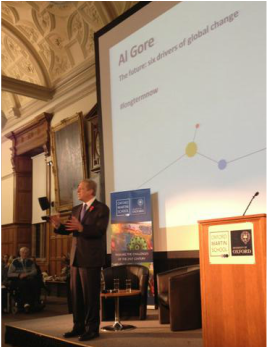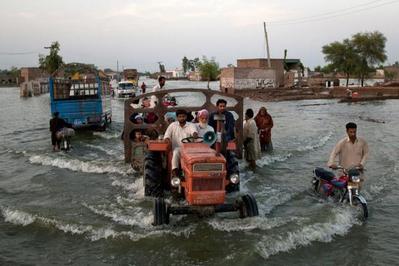 Tim Dobermann, Healthy Planet COP19 delegation Have we reached critical mass - a global tipping point - in the climate debate? If not, just how long will it take for the world to act on climate change? Not long, said Al Gore on Thursday during his Distinguished Lecture for the Oxford Martin School. Citing the civil rights movements in the mid-20th century, and more recently, the sharp turnaround in public opinions over gay marriage, Gore spoke of the significant role movements can play in spurring national and international action. More importantly, he spoke of how - once reaching a critical level of public attention - these issues rapidly exploded onto the political scene, with reforms following soon after. Our role in shaping the Earth's climate is now beyond question, and the world's leading Earth scientists have laid out what a safe operating space for humanity looks like - and the areas in which we are transgressing those boundaries. However, our responses have been muted; timid, at best. Climate change is an incredibly complex issue. It spans many disciplines and concerns all aspects of our society: economic, political, social, moral and ecological. Only until recently have serious efforts been made to communicate these effects to the public. Fundamentally, we need a change in mindset about how we view the way we interact with our planet and its ecosystems. We must recognise that, like all species before us - and all species after us - we are dependent on nature for our survival and well-being. Al Gore draws hope from the fact that all successful movements in the past had one link in common: despite their inherent complexities, they quickly evolved into a simple decision over what was deemed right and what was deemed wrong. It is wrong to segregate or discriminate against people based on the colour of their skin. It is wrong to outcast individuals for their sexual orientation. Now, more than ever, it is wrong to recklessly continue polluting our oceans, ecosystems and atmosphere, damaging our health and placing increasing strain on vulnerable households across the world. Out of a formidable list of factors that will drive our future - rapid globalisation of economic activity, information technology continuing to connect our world, and inequality pulling our societies apart, amongst others - Gore is not hesitant to declare climate change the largest single driving force of our future.  The aftermath of the 2010 Pakistan floods. Image source: LA Information The aftermath of the 2010 Pakistan floods. Image source: LA Information It's no surprise why. Though the impacts of climate change will not be distributed evenly across the globe, climate change will change what we view as normal - and to an extent it already has. Extreme weather events like the unprecedented European heatwave of 2003, with an estimated death toll of 70,000, or the heavy flooding in Pakistan in 2010, which displaced over 1.5 million from their homes and adversely affected millions of others, are projected to become much more common. But the effects of climate change on our health and well-being extend far beyond extreme weather events or storms. As the 2009 UCL/Lancet Commission 'Managing the Health Effects of Climate Change' highlighted, often overlooked are the indirect health impacts: water scarcity and more variable rainfall leading to food insecurity and malnutrition, droughts breeding conflict and unrest, or the mass displacement of populations -`environmental refuguees' - out of desperation. To prevent catastrophic warming, and to avoid further harm to those least responsible for the emission of greenhouse gases, we must usher in a new era of widespread ecological sustainability. Gore, in a sincere display of passion, ended with a final anecdote: a memory of him as a child, aged 13, listening to John F. Kennedy's famous words on challenging the nation to send a human being to the Moon and back. Many said it wasn't possible; it was too expensive; it just wouldn't work. Eight years later, in 1969, the world held its breath as humans took their first ever steps on the Moon. Euphoric, the team at NASA headquarters burst into cheers and applause. At the time, the average age of the NASA engineers in the room was 26. This means that, eight years earlier when Kennedy challenged the entire nation, they were only 18. This story couldn't better reflect how the young people and students of today can - and should - play an active role in shaping our future. With dedication and determination, we can play a tremendous role in ensuring that we establish a safe, just and sustainable operating space for humanity.
3 Comments
Gabriele Messori
2/11/2013 03:04:40 am
Excellent overview! I agree that young people today still have a chance to make a huge impact on our planet's future, but the key lies in international co-operation. Unlike issues such as homosexual marriage and racism, many climate policies have limited effects if implemented on a national scale. Closing a coal-fired power plant in Europe will have limited effect if the pollution caused by ones in Asia only takes a matter of weeks, if not days, to be carried half-way around the globe.
Reply
Alicia
2/11/2013 07:34:23 am
Thought-provoking article! Well done!
Reply
Ricardo Taveres da Costa
5/11/2013 02:23:00 pm
"We must usher in a new era of widespread ecological sustainability." But make no mistake, we should not wait for technology to solve all of our problems, it is also a matter of changing our behavior. By stating we/our I am definitely including myself. Thank you for this post Tim
Reply
Leave a Reply. |
Details
Archives
February 2019
Tags
All
|
 RSS Feed
RSS Feed
